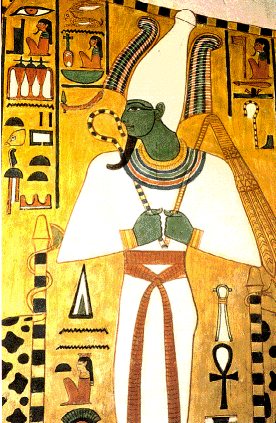
Underworld page
ancient polytheism:
Egyptian Overview
Norse Overview
War Deities
Underworld Deities
 Osiris was the Egyptian god of the underworld--a position held to the Egyptians almost as highly as the position of Creator, and sometimes even more highly than such a position. To the Egyptians, the underworld was considered extremely important, probably due to the sun-scorched regional climate. The Egyptians envisioned the underworld as a place completely opposite of reality: while reality was hot and work was difficult, the underworld was cool and a place of rest; while Ra, the Sun god ruled over the world of the living, Osiris ruled just as strongly over the world of the dead.
Osiris was the Egyptian god of the underworld--a position held to the Egyptians almost as highly as the position of Creator, and sometimes even more highly than such a position. To the Egyptians, the underworld was considered extremely important, probably due to the sun-scorched regional climate. The Egyptians envisioned the underworld as a place completely opposite of reality: while reality was hot and work was difficult, the underworld was cool and a place of rest; while Ra, the Sun god ruled over the world of the living, Osiris ruled just as strongly over the world of the dead.Osiris was said to allow only those who lived virtuous lives and were buried under specific conditions to be allowed into his kingdom. Among these burial specifications were special ceremonies, including chants and sometimes mummification, symbolic amulets, and the recitation upon death of "divine words" that had to be memorized from the book of the Dead, a prominent scripture of the ancient Egyptian religion.
A notable difference between Osiris and the rest of the significant gods of the Egyptian pantheon was that Osiris was once mortal, while most of the other gods were born of Ra, the great creator deity. Simplified, the story of Osiris is that when Osiris, still a mortal man, died, he was able to use unknown mystical powers after death to continue living. This story symbolizes the beginning of his reign over death, as it portrays him as having dominion over even his own fatality. Osiris' ties to mysticism, as apparent the story, showed up through the ceremonies that people underwent upon death, which were done as recreations of Osiris' initial ceremonial recreation of himself.
The underworld was so important to the Egyptians that Osiris was a near-contender for the position of head god. Copies of the "Pyramid Texts" from the time of Egypt's greatest development even referred to Osiris in some parts as "god" alone--no other deities, not even Ra, were given such an honor. It has even been said by some that Osiris was the most highly revered god of Egypt, even over Ra, because the Egyptians were so concerned with life after death.

Greek

Egyptian

Norse